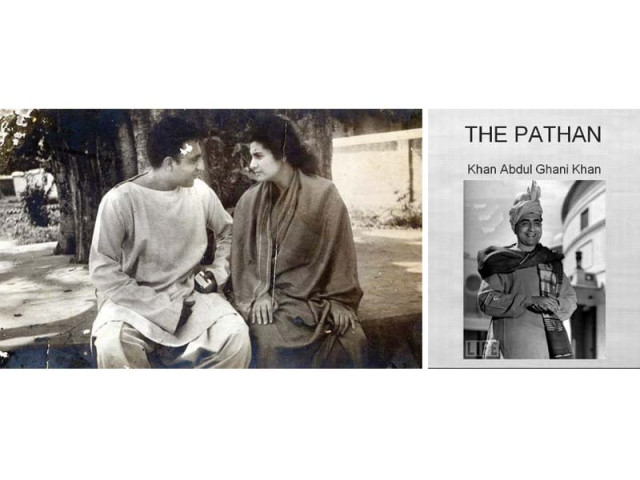1914-1996: Pashto translation of The Pathan released on 20th death anniversary
Ghani Khan’s only English work details of Pukhtun culture, history

(Left) Ghani Khan and his wife, Roshan; (Right) the cover of The Pathan. PHOTOS COURTESY: TWITTER/EXPRESS
The translation was commissioned by POHA Research Institute. Khatir Manirwal, a Pashto writer, has translated the book.
Lasting effect
Ghani Khan is otherwise known for his Pashto poetry. His popularity can be gauged from the fact his poetry has been adapted into folk songs heard by a large number of Pukhtuns. His poetry, art and sculptures have left a lasting impression on people across the world.
He was born in Charsadda in 1914 and is considered one of the finest Pashto poets of the 20th century.
Bang bang, she shot me down: Women and guns, the beginning and end of Pashto cinema
Ghani was the eldest son of Khan Abdul Ghaffar Khan, who is also known as Bacha Khan. He was married to Roshan, the daughter of Nawab Rustam Jang who belonged to a Parsi family.
Ghani’s rich oeuvre includes Kuliyat-e-Ghaniand, The Pathan and a series of paintings and sculptures. A large number of his paintings have been put on display at his residence
in Charsadda.
Pukhtunwali
The Pathan offers a short history of Pukhtuns. It puts the spotlight on the social, economic and political system of Pukhtun society. The book weaves together the threads of the Pukhtun code of living. It sheds light on the courage, hospitality, kinship, and values that are embodied in Pukhtunwali.
The Pathan also offers details on folk music, and fairy tales. The purpose of translating The Pathan into Pashto is to make it accessible to a large number of readers. “The Pathan is a combination of philosophy, history and fiction,” Manirwal told The Express Tribune. He added the book is a short but comprehensive description of Pukhtun history, culture and heritage.
Selling the drama: Artistes ask for their theatre back
According Shafiq Gigyani, who works at POHA Institute, the book will help the Pukhtuns understand Ghani’s teachings in their own language. “Earlier, someone else had translated the book into Pashto as well,” he said. “However, it vanished from the market and wasn’t reprinted.”
Origins of Pukhtuns
The book also discusses another important aspect which has puzzled historians for generations – the origin of Pukhtuns.
In his book, Ghani claims there is no clear evidence of the origins of Pukhtuns. However, he suggests Pukhtuns might descend from Aryans. The poet did not believe Pukhtuns had Jewish origins.
Although most of his work was in Pashto, The Pathan was written English to make the British aware of Pukhtuns and their rich cultural heritage.
Published in The Express Tribune, March 16th, 2016.













COMMENTS
Comments are moderated and generally will be posted if they are on-topic and not abusive.
For more information, please see our Comments FAQ